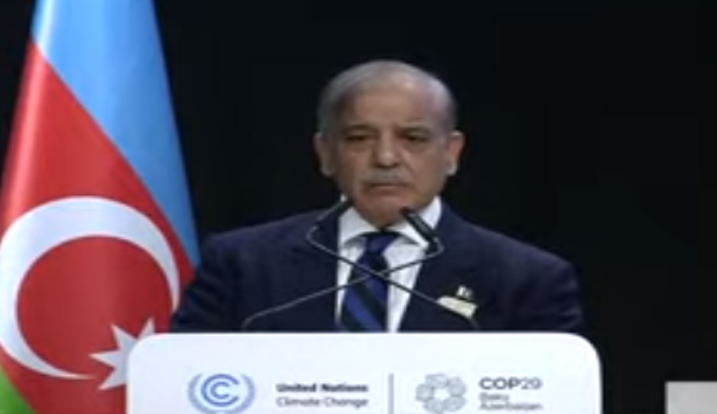Baku (Web Desk): Prime Minister Shehbaz Sharif has called on the international community to fulfill its financial promises to combat climate change, urging that the funds pledged at past climate summits be released to help vulnerable nations cope with the ongoing climate crisis.
Addressing the Climate Action Summit (COP29) in Baku on Wednesday, he regretted t that many of the financial commitments made by developed countries have not yet been honoured, leaving developing nations, like Pakistan, to face the consequences of global warming with insufficient resources.
PM Shehbaz emphasized that the financial support for climate action should be grant-based, rather than in the form of loans, which would exacerbate the debt burden of countries already struggling economically.
He made it clear that climate finance must be designed to support the most vulnerable nations without adding to their financial distress.
PM Shehbaz highlighted the principle of "climate justice," asserting that there can be no real resilience or meaningful action on climate change without equity in the distribution of financial resources.
This, he explained, means that wealthier nations, which have contributed the most to global emissions, must provide the necessary funding to assist those nations that are disproportionately affected by climate impacts despite having contributed very little to the problem.
In his remarks, PM Shehbaz pointed to the devastation caused by the catastrophic 2022 floods in Pakistan, which affected millions of people, destroyed infrastructure, and caused extensive damage to crops and livelihoods.
“Despite contributing less than 0.5% of global greenhouse gas emissions, Pakistan remains one of the most vulnerable countries to the effects of climate change,”. the premier said, underscoring that climate change impacts are already devastating lives in Pakistan, and the country cannot afford to wait for external aid to arrive once disaster strikes.
PM Shehbaz reinforced that Pakistan, while facing such vulnerabilities, remains a resilient and responsible nation committed to contributing positively to global climate solutions.
Shehbaz outlined his government’s efforts to accelerate the transition to a greener economy, including ambitious targets for renewable energy and electric vehicles.
“By 2030, Pakistan plans to generate 60% of its energy from clean sources and shift 30% of its vehicle fleet to electric vehicles,” the premier said, adding that these efforts are part of a broader push to revolutionise Pakistan’s energy sector, positioning the country as a leader in clean energy adoption in South Asia.
In addition to these ambitious energy and transportation goals, PM Shehbaz pointed to Pakistan’s ongoing efforts to adapt to the changing climate.
“Last year, the country launched a comprehensive national adaptation plan to better prepare for the challenges posed by climate change, and this year it unveiled a national framework for a carbon market aimed at reducing emissions and generating additional climate finance,” the premier said.
However, despite these substantial national efforts, PM Shehbaz made it clear that Pakistan cannot achieve its climate goals alone. He called for increased international cooperation and financial support, stressing that the developed world must fulfill its long-standing promises to fund climate adaptation and mitigation in the Global South.
The prime minister warned that without such support, vulnerable countries like Pakistan would struggle to meet their climate commitments and face greater hardships in the years ahead.
“The fight against climate change requires collective global action, with both financial and technological support flowing to those countries most in need,” PM Shehbaz said, reiterating that the success of international climate efforts will depend not only on the pledges made but also on the prompt delivery of financial resources, so that nations like Pakistan can build the resilience needed to face the increasingly severe impacts of climate change.
It is pertinent to mention that in 2022, Pakistan experienced catastrophic flooding during the monsoon season, worsened by the impacts of climate change, which led to the tragic loss of at least 1,700 lives.
The floods affected around 33 million people, displacing families and causing widespread destruction. Vast areas of agricultural land were inundated, resulting in severe losses to the country’s farming sector.
According to government estimates, the total economic damage from the disaster amounted to approximately $30 billion.
In June 2024, Pakistan faced another extreme climate event—an intense heatwave that brought record-breaking temperatures across the country.
The extreme heat placed immense pressure on public health systems, leading to an increase in heat-related illnesses and fatalities.
The agricultural sector also suffered significantly, with crops damaged by the intense heat, further deepening concerns over food security and economic stability.
These events serve as a powerful reminder of the urgent need for global action on climate change.


